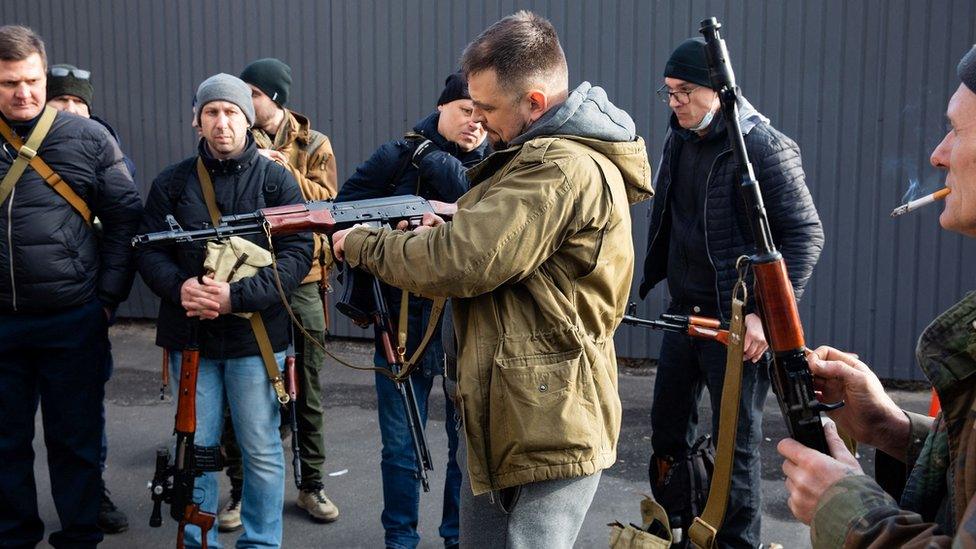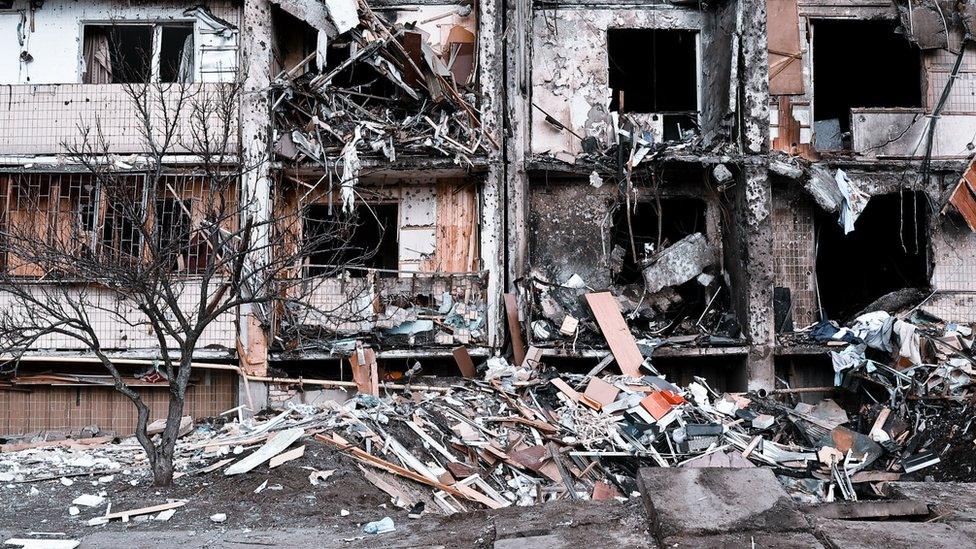Ukraine conflict: UK intelligence fears ‘bloody and brutal’ war
- Published

Members of the Territorial Defence Forces of Ukraine receive weapons
Cabinet ministers received what one source described as an "ominous assessment" from defence and intelligence chiefs on Thursday night about what may lie ahead for the people of Ukraine.
And it has now become clearer what the fears of the Western allies are.
Ukrainian resistance to Russian President Vladimir Putin's forces is - for the people of the country - something of a double-edged sword.
Intelligence assessments suggest Russian forces are making slower progress than they had envisaged.
A well-placed Western official suggested Ukrainian forces had traded control of "empty spaces" and "rural areas" to concentrate on defending the cities.
There are now significant concerns Mr Putin will look to effect his aim of regime change in the capital Kyiv "by any means necessary", that source said.
That could mean the indiscriminate use of violence and the indiscriminate use of artillery - with the civilian population very much in the firing line.
This view is shared in Whitehall - that the more resistance the Russian forces face, the more relentless the retaliation they will carry out.
What was a war of choice for Mr Putin could become a war of necessity, which he has to be seen to win.

Russia attacks Ukraine: More coverage
THE BASICS: Why is Putin invading Ukraine?
FROM KYIV: "There is no safe place any more"
FROM MOSCOW: Shock and support in Russian capital
IN MAPS: How Russia carried out the invasion

In conversation with politicians and other government sources with good links to the defence and intelligence services, it is anticipated that when Russian forces formally take control of Ukrainian cities an insurgency will be mounted against them.
This, one source predicted, would be "bloody and brutal".
Another went as far as to express fears the tactics adopted by Russian forces at the beginning of the century in Grozny could, if necessary, be adopted again.
The Chechen city was subjected to heavy barrages of artillery, costing at least 5,000 lives.

Residential areas of Kyiv have already suffered damage
There is also an expectation that Russian FSB agents operating in Ukraine will try to suppress dissent by targeting Moscow's vocal opponents.
The hope is the cost of deploying troops and material in Ukraine, and the economic damage of sanctions, might force a change of strategy or indeed leadership.
But a protracted period of conflict and sanctions is envisaged.
A glimmer of hope?
Those who look for a glimmer of hope amid this grim landscape would argue Mr Putin is at risk of getting the opposite of what he wants - Nato reinforcing its eastern borders, greater isolation, and a more unified Ukrainian population.
They point, too, to the bravery of those Russians who have protested against the invasion.
But some Conservative as well as opposition MPs are urging more weaponry of all kinds - from flak jacket body armour and sat-phones to anti-aircraft missiles - to be sent to Ukraine and quickly.
On the record the government is remaining tight-lipped about the level of support being provided, but off the record it is saying more is on the way.
However, the government will not specify exactly what and some MPs who have been in touch with their Ukrainian counterparts - who fear for their own safety - are not yet convinced enough is being done.
And there is frustration the West did not seem to read or react to Russia's hostile intentions swiftly enough.
As one MP with a military background put it: "There has been lack of strategic foresight."
Prime Minister Boris Johnson has said he is determined to see Mr Putin fail.
But it would seem the assessment in Whitehall is that victory won't come swiftly or easily.
In the immediate future, for all their bravery, the outlook for Ukrainians is bleak.